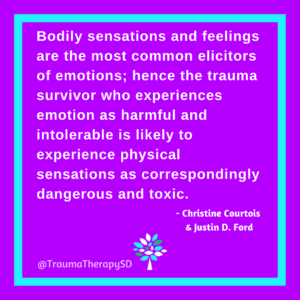Quote from Christine Courtois & Justin D. Ford

In my work, being disconnected or unaware of one’s body is a huge red flag signaling trauma and dissociation.
If you are someone who does not know when they are hungry, when they are thirsty, when they have to use the restroom, or are prone to injuries that you did not notice, these are indications that something is missing.
Often these strategies are learned in early childhood as coping skills for intolerable situations. If a baby cries because it is hungry, but no one ever responds, or responds inconsistently or angrily, the baby may learn to simply stop noticing when it is hungry.
Depending on how the parental figures react, they may have concluded it is too painful to be hungry as no one feeds them, or they may conclude that having need are too painful as they will not be responded to.
When that baby grows up into adulthood, they may find that physical sensations are experienced as scary, dangerous, harmful or toxic, which reinforces the strategy of dissociating away this knowledge. This in turn makes understanding emotions difficult.
It can be a complex and difficult knot to untangle. Learning to be in the body, to notice physical sensations and then learn to connect them to what they signal takes time and work, but it can certainly be done. And it will be worth the effort.
In my work, being disconnected or unaware of one’s body is a huge red flag signaling trauma and dissociation.
If you are someone who does not know when they are hungry, when they are thirsty, when they have to use the restroom, or are prone to injuries that you did not notice, these are indications that something is missing.
Often these strategies are learned in early childhood as coping skills for intolerable situations. If a baby cries because it is hungry, but no one ever responds, or responds inconsistently or angrily, the baby may learn to simply stop noticing when it is hungry.
Depending on how the parental figures react, they may have concluded it is too painful to be hungry as no one feeds them, or they may conclude that having need are too painful as they will not be responded to.
When that baby grows up into adulthood, they may find that physical sensations are experienced as scary, dangerous, harmful or toxic, which reinforces the strategy of dissociating away this knowledge. This in turn makes understanding emotions difficult.
It can be a complex and difficult knot to untangle. Especially if you are also trying to understand or explore your sexual orientation or gender identity. Learning to be in the body, to notice physical sensations and then learn to connect them to what they signal takes time and work, but it can certainly be done. And it will be worth the effort.










